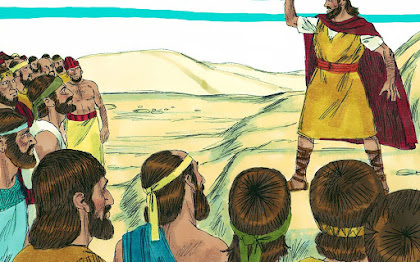One mark of great writers is that their writings often transcend their deeds. Isaiah was a great man, yet his life history seems swallowed up in the sheer force of his fascinating prophecies and brilliant imagery. We do know that he was an eighth-century prophet and historian during the reigns of Judean kings: Uzziah, Jotham, Ahaz, and Hezekiah. His wife was known as a prophetess and they had at least two sons. We may picture Isaiah as eloquent, modest and dignified, but God asked him to walk naked and barefoot among the Judeans for three years and he did it. This was God’s very striking way of warning Judah that Assyria would defeat Egypt and Ethiopia and carry them away naked to Assyria.

Isaiah
Early in his ministry, Isaiah saw a vision which lit a holy flame in his heart—a flame that was never snuffed out: “I saw the Lord, high and lifted up and his train filled the temple. …the seraphim cried, ‘Holy, holy, holy is the Lord of hosts. The whole earth is full of his glory!’ …Then said I, ‘Woe is me for I am undone! ….my eyes have seen the Lord of hosts.’ And I heard the voice of the Lord saying, ‘Whom shall I send and who will go for us?’ Then said I, ‘Here am I; send me.’ ”
Isaiah made himself available as the mouthpiece of God to the people. He railed against empty, ritualistic sacrifice: ” ‘To what purpose is the multitude of your sacrifices to me?’ says the Lord… ‘Your incense is an abomination to me… Cease to do evil. Learn to do good: seek judgment, relieve the oppressed, judge the fatherless, plead for the widow.’ ”
Slicing satire characterized the prophet’s description of the false god: “The laborerheweth down cedars. The carpenter stretcheth out his rule, marks his measurements with a compass, and forms the figure of a man. He uses a portion of the wood to burn. He warms himself and roasts flesh for food. With the residue he fashions a god, even his graven image. He falls down to it, worships it, and prays to it. He says, ‘Deliver me for you are my god.’ His eyes are shut. He feeds on ashes. He does not ask, ‘Why do I fall down and worship before the stock of a tree?’ ”
Not reluctant to declare the judgment of God, Isaiah vividly described God’s wrath against evil: “I have trod the winepress of judgment alone. I will tread them in my anger, and trample them in my fury! Their blood shall be sprinkled upon my garments, and I will stain my raiment.”
Isaiah also described a mysterious figure who would someday be “a light to the Gentiles.” In one of his most famous writings, the prophet described this coming Messiah, not as a conquering deliverer but a suffering savior: “He is despised and rejected of men; a man of sorrows and well acquainted with grief, and we hid our faces from him. All we like sheep have gone astray. We have turned, every one, to his own way, and the Lord has laid on Him the iniquity of us all. He was wounded for our transgressions. He was bruised for our iniquities. The chastisement of our peace was upon him and with His stripes we are healed…”
All the prophet’s writings were not saturated with judgment or sorrow. He also wrote comfortingly of a future day when peace would come, God’s people would be restored, and God would embrace them lovingly: “…they shall beat their swords into plowshares and their spears into pruning hooks; nation shall not lift up sword against nation, neither shall they learn war any more. In that day my house shall be called a house of prayer for all peoples. The wolf and the lamb shall feed together, and the lion shall eat straw like the bullock. The Lord will swallow up death in victory; and the Lord God will wipe away tears from off all faces.”
So powerful and picturesque is Isaiah’s language, that even today excerpts are used universally by many speakers and writers. What a prophet, and what a writer!
WHAT CAN WE LEARN FROM ISAIAH?
Isaiah emerges as an outstanding historian, prophet, and writer. Sometimes we are tempted to view particular talents as secular and others as spiritual. God does not necessarily see it from that perspective. He can take any ability with which He has gifted us and use it for His glory. As in Isaiah’s life, gifts offered to God can be used and blessed.
BIBLE VERSES ABOUT ISAIAH
2 Kings 19:2; 2 Chron. 26:22; Isaiah chaps. 1-65; Matthew 3:3, 4:14
WHAT QUESTIONS DOES THIS HELP TO ANSWER?
- Who was Isaiah in the Bible?
- Is Isaiah relevant today?
- What does Isaiah say about Jesus?
- What was Isaiah’s vision?

No comments:
Post a Comment